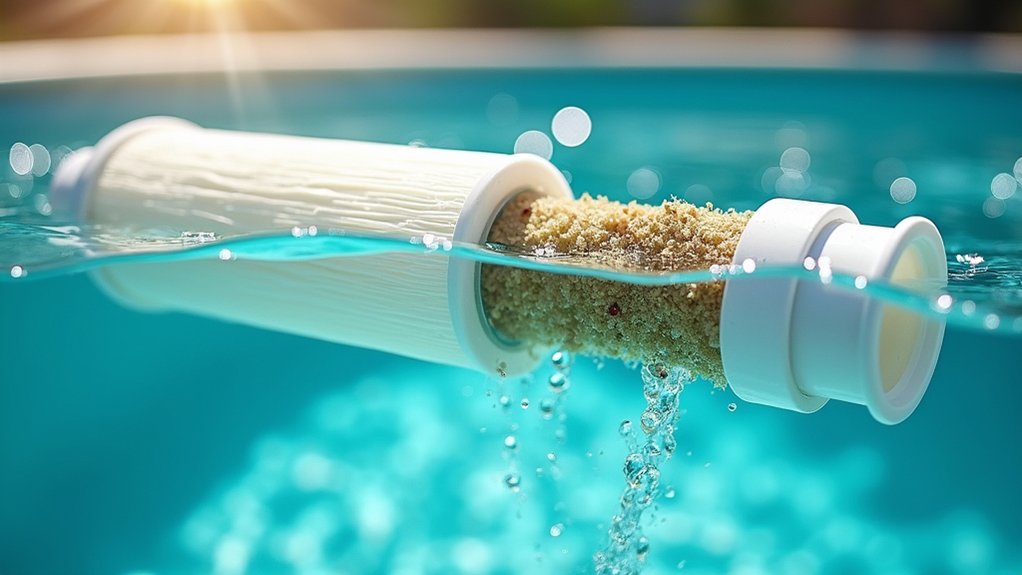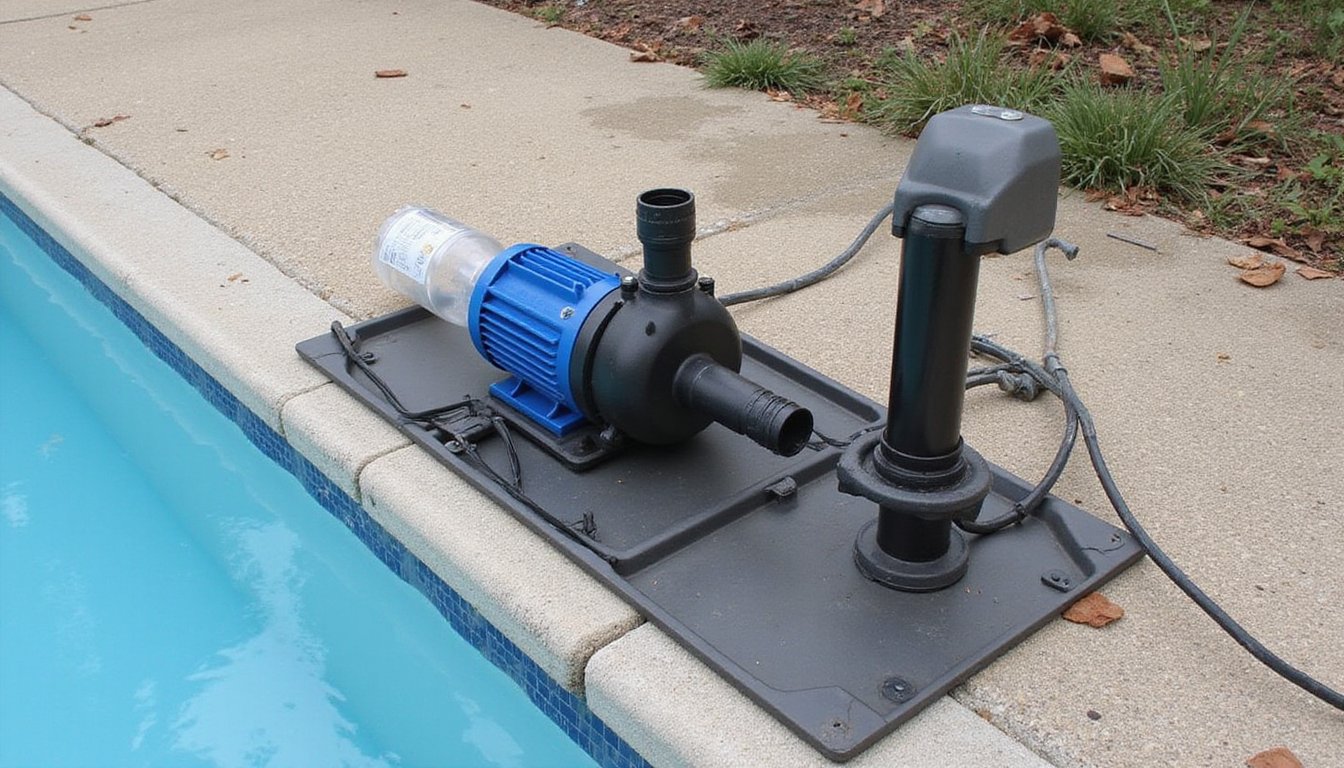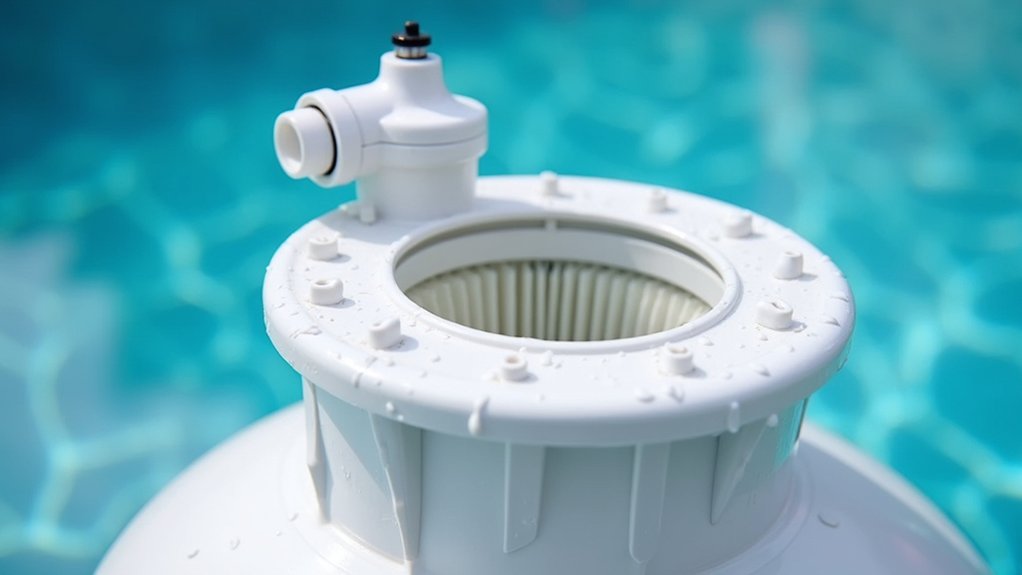To size your pool heater accurately, use a pool heater size calculator. First, input your pool's dimensions to determine its volume. Next, specify the desired temperature increase and consider factors like temperature loss due to wind or evaporation. This helps identify the necessary BTU output for effective heating. Also, note local climate conditions, as they influence heater efficiency. A correctly sized heater minimizes energy waste and enhances your swimming experience. If you want to know about different heater types and their features, there's more essential information that can guide your decision-making process.
Key Takeaways
- Use pool dimensions (length, width, depth) to accurately calculate total volume for proper heater sizing.
- Input desired temperature rise and climate zone to assess heat loss and heater capacity needs.
- Consider heat loss factors like wind exposure and pool cover usage to enhance heating efficiency.
- Regular maintenance and accurate sizing help minimize energy waste and ensure consistent pool temperatures.
- Compare heater output metrics and efficiency ratings to select the best model for your pool's needs.
Understanding Pool Heater Basics
When it comes to maintaining a comfortable swimming environment, understanding pool heater basics is essential. You'll want to grasp how pool heater efficiency directly impacts your energy consumption and overall costs. A pool heater's efficiency is determined by its ability to convert energy into heat effectively. Higher efficiency ratings mean more warmth generated with less energy, which reduces your utility bills.
Different types of heaters, such as gas, electric, and heat pumps, have varying efficiencies. Gas heaters typically heat water quickly but may have higher energy consumption. Electric heaters can be more efficient for smaller pools, while heat pumps work best in warm climates, drawing energy from the air, resulting in lower operational costs.
To maximize pool heater efficiency, consider setting your desired temperature wisely. Lowering it by just a few degrees can considerably reduce energy consumption. Regular maintenance, such as cleaning filters and checking for leaks, also enhances efficiency.
Importance of Heater Size
Choosing the right heater size is essential for ensuring your pool reaches and maintains the desired temperature efficiently.
If you select a heater that's too small, it won't adequately heat your pool, leading to discomfort and increased energy costs. Conversely, a heater that's too large can waste energy, driving up installation costs and operational expenses.
Here are three key reasons why heater size matters:
-
Energy Efficiency: A properly sized heater operates at maximum efficiency, minimizing energy waste. This not only saves you money on utility bills but also reduces your environmental impact.
-
Temperature Stability: With the right heater size, your pool will maintain a consistent temperature. This stability enhances your swimming experience, allowing you to enjoy your pool more often and comfortably.
-
Longevity of Equipment: An appropriately sized heater experiences less wear and tear. It won't have to overwork to achieve your desired temperature, which prolongs the lifespan of the unit and reduces maintenance costs.
Factors Influencing Heater Size
When determining the appropriate size for your pool heater, consider the pool's dimensions, as larger pools require more heating capacity.
You'll also need to account for the desired temperature increase, which directly impacts the heater's output.
Additionally, evaluate heat loss factors, such as wind exposure and pool cover usage, to guarantee efficient heating.
Pool Size Considerations
Determining the appropriate size for your pool heater hinges extensively on the dimensions of your pool. Several factors come into play, including the pool shape and water depth, both of which considerably affect the overall volume of water that needs heating.
Consider these key aspects when calculating your heater's size:
-
Pool Shape: Whether your pool is rectangular, oval, or freeform, the shape impacts the total surface area and volume. A more complex shape can lead to variations in heating efficiency and time.
-
Water Depth: The average water depth determines how much water your heater needs to warm. Deeper pools hold more water, requiring a larger heater to achieve your desired temperature effectively.
-
Surface Area: The surface area of your pool influences heat loss due to evaporation. Larger surface areas may necessitate a more powerful heater to maintain consistent temperatures.
Desired Temperature Increase
To achieve your desired pool temperature, understanding the required temperature increase is essential for selecting the right heater size. The temperature increase is determined by the difference between your target temperature and the current water temperature.
For instance, if you aim to raise the temperature from 70°F to 80°F, you need a 10°F increase.
This temperature increase directly impacts your heater's size and heating efficiency. A larger heater is often necessary for significant temperature increases, especially in colder environments or during colder months.
Conversely, if you only need a slight increase, a smaller heater may suffice.
Additionally, consider how quickly you want the pool to reach that temperature. Faster heating requires a more powerful heater, as it must generate more energy in a shorter time frame.
This also relates to temperature maintenance; the heater will need to work harder to maintain the desired temperature, especially in fluctuating weather conditions.
Heat Loss Factors
Understanding heat loss factors is essential for accurately sizing your pool heater. Various factors contribute to heat transfer from your pool, and each one can considerably impact the efficiency of your heating system.
Here are three key heat loss factors you should consider:
-
Surface Area: The larger the surface area of your pool, the more heat it loses to the surrounding air. Wind and evaporation can exacerbate this loss, especially in outdoor pools.
-
Water Temperature: The higher the temperature of your pool water compared to the ambient air, the greater the potential for heat loss. This is particularly relevant during cooler months or in windy conditions.
-
Insulation Techniques: Using effective insulation techniques can dramatically reduce heat loss. Consider adding pool covers, windbreaks, or even solar heaters to help maintain your desired temperature.
How to Use a Calculator
To use the pool heater size calculator effectively, start by inputting the required parameters, such as pool volume and desired temperature rise.
Once you've entered the data, the calculator will provide output results that indicate the appropriate heater size for your needs.
Understanding these results is essential for ensuring ideal heating efficiency and performance.
Input Required Parameters
When using a pool heater size calculator, you'll need to input specific parameters to guarantee accurate results. Each parameter has its own significance, so understanding the input types and required units is vital.
Here's what you'll typically need to provide:
-
Pool Size: Measure your pool's length, width, and depth in feet. This helps calculate the total volume of water in gallons.
-
Desired Temperature Increase: Specify how many degrees Fahrenheit you want to raise the water temperature. This is essential for determining the heating capacity required.
-
Climate Zone: Indicate your geographical location, as this affects heat loss and overall efficiency. Different zones may require different heating considerations.
Understanding Output Results
The output results from a pool heater size calculator provide essential insights into the heating requirements of your pool. These results typically include critical metrics such as heat output and efficiency ratings, which help you assess the best heater for your needs.
| Metric | Description |
|---|---|
| Heat Output | The BTU required to maintain desired temperature. |
| Efficiency Ratings | Percentage indicating how effectively the heater converts energy into heat. |
Understanding these metrics allows you to make informed decisions about energy consumption and cost analysis. When reviewing the output, pay attention to installation guidelines to guarantee proper setup. Maintenance tips can also extend your heater's lifespan, so consider these alongside the calculator results.
Additionally, comparing different brands based on user reviews can help you gauge reliability and performance. By analyzing the output results, you can optimize your pool heating system while minimizing energy costs, ensuring that you enjoy a comfortable swimming experience year-round.
Calculating Pool Volume
Understanding how to calculate your pool's volume is essential for selecting the right heater size. Knowing the volume helps guarantee that your heater can efficiently warm your pool. The calculation varies depending on the pool shape and water depth. Here's how you can calculate it:
-
Rectangular Pools: Multiply the length, width, and average water depth. The formula is: Volume = Length × Width × Depth.
-
Circular Pools: Use the formula: Volume = π × (Radius²) × Depth. Here, the radius is half the diameter of your pool.
-
Freeform Pools: To estimate the volume, divide the pool into smaller sections (rectangles, circles, etc.), calculate each section's volume, and then sum them up.
Once you've calculated your pool's volume in gallons, you can accurately select a heater that meets your specific heating needs.
Desired Temperature Settings
After determining your pool's volume, it's time to contemplate your desired temperature settings. Your temperature preferences directly influence the efficiency of your pool heater and its overall size.
Generally, a comfortable pool temperature ranges from 78°F to 82°F. However, you may want to adjust this based on personal comfort or specific activities, such as swimming or soaking.
Consider how seasonal adjustments affect your heating needs. In colder months, you might aim for a warmer temperature to counteract the chill, while in warmer months, you might prefer a cooler setting. Each degree you increase the temperature can considerably impact energy consumption and operational costs.
It's essential to factor in how quickly you want your pool to reach your desired temperature. If you regularly swim or host gatherings, a higher capacity heater may be necessary to heat your pool quickly, accommodating your schedule and preferences.
Regional Climate Considerations
When considering your pool heater's size, regional climate plays an essential role in determining heating needs and efficiency. Different areas experience unique weather patterns, which can greatly impact your pool's temperature retention and heating requirements.
Here are three key factors to keep in mind:
-
Winter Weather: In regions with harsh winter weather, you'll need a more powerful heater to counteract substantial temperature fluctuations and maintain your desired pool temperature.
-
Humidity Levels: High humidity can affect how heat is retained in your pool. If you live in a humid area, you may need to adjust your heater's capacity to accommodate increased evaporation rates.
-
Sun Exposure and Wind Patterns: Pools with ample sun exposure will naturally retain heat better than those in shaded or windy areas.
Consider local regulations and regional preferences regarding pool usage to optimize your heater's efficiency.
Choosing the Right Heater Type
Selecting the right pool heater type is essential for achieving ideal heating efficiency and comfort. When considering your options, you'll typically choose between electric vs gas heaters or solar options. Each type has unique advantages and considerations that can influence your decision.
Electric heaters are generally easier to install and maintain. They're ideal for smaller pools or for those who use their pool infrequently, as they heat the water gradually and efficiently. However, they can have higher operational costs in regions with expensive electricity.
On the other hand, gas heaters provide rapid heating and are suitable for larger pools or those used frequently. They work well in colder climates, but their operational costs can be higher than electric options depending on local gas prices.
If you're looking for a more eco-friendly and cost-efficient solution, consider solar options. Solar heaters harness sunlight, making them environmentally friendly and cost-effective in the long run. However, they require adequate sun exposure and may not heat the pool quickly enough for immediate use.
Evaluate your specific heating needs, budget, and environmental impact to make the best decision.
Frequently Asked Questions
What Are the Consequences of an Oversized Pool Heater?
Imagine turning a gentle stream into a raging river; that's what an oversized pool heater does.
You'll face energy waste as it consumes more power than necessary, driving up your bills.
Plus, you'll experience temperature fluctuations, making your pool uncomfortable.
The heater works harder than it should, leading to potential breakdowns and costly repairs.
Ultimately, you're left with an inefficient system that neither saves money nor provides a pleasant swimming experience.
Can I Use a Pool Heater for a Hot Tub?
Yes, you can use a pool heater for a hot tub, but consider hot tub compatibility first.
Make certain the heater's capacity matches your hot tub's size and heating requirements. During heater installation, guarantee proper connections and follow manufacturer guidelines for peak performance.
An oversized heater might heat water too quickly, causing inefficiencies and discomfort.
How Often Should I Check My Pool Heater's Performance?
You might wonder how often you should check your pool heater's performance.
To maintain ideal heater efficiency, it's essential to perform regular performance testing. Aim to check it at least once a month during peak usage.
Look for fluctuations in temperature and unusual sounds, which could indicate problems. If you notice anything off, don't hesitate to investigate further; addressing issues early can save you from larger, costly repairs down the line.
Are There Energy-Efficient Heater Options Available?
Absolutely, there are several energy-efficient heater options available for your pool.
Solar heaters harness sunlight to warm your water, making them eco-friendly and cost-effective over time.
Heat pumps, on the other hand, extract heat from the air and transfer it to the water, providing efficient heating even in cooler conditions.
Both options greatly reduce energy consumption compared to traditional gas heaters, allowing you to enjoy a warm pool while saving money on utility bills.
What Maintenance Does a Pool Heater Require?
Think of your pool heater as a loyal guard, guaranteeing your oasis stays warm.
To extend its lifespan, you need a solid maintenance checklist. Regularly check for leaks, clean filters, and inspect the thermostat.
You should also flush the system to remove debris and scale buildup.
Don't forget to test the pressure relief valve and guarantee proper ventilation.
Conclusion
Choosing the right pool heater size isn't just about warmth; it's about efficiency and comfort. While a larger heater might heat your pool faster, it can also lead to higher energy bills. Conversely, a smaller unit may save money but struggle to maintain your desired temperature. By carefully evaluating your pool volume, climate, and heating needs, you can strike the perfect balance, ensuring you enjoy a comfortable swim without unnecessary costs or wait times.






